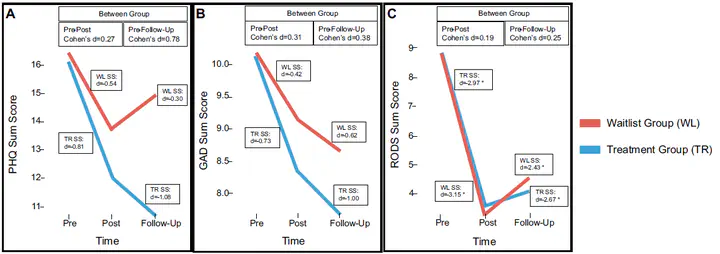Evaluating a mobile app’s effects on depression and anxiety in medication-treated opioid use disorder

Abstract
Depression and anxiety frequently co-occur with opioid use disorder (OUD) yet are often overlooked in standard OUD treatments. This study evaluated the feasibility, acceptability, and preliminary effectiveness of a mobile application designed to address these symptoms in individuals receiving medications for OUD (MOUD). A randomized controlled trial recruited N = 63 adults with OUD who received MOUD and screened positive for moderate depression or generalized anxiety. Participants were randomized to an app-based digital intervention or treatment-as-usual for 4 weeks, and completed follow-ups at 4 and 8 weeks. Primary outcomes were self-reported severity measures for depression and generalized anxiety, and urine drug screens (UDS). Secondary outcomes included self-reportedOUDseverity, craving intensity, and digital biomarkers derived from passive smartphone sensors. The application was well-received (median app rating = 4/5 stars). The intervention group showed significant reductions in depressive and generalized anxiety symptoms post-intervention and at 8 weeks follow-up (d > 0.70), with large (d = 0.78) and moderate (d = 0.38) effect sizes, respectively, compared to controls. Both groups exhibited substantial decreases in self-reported severity of opioid use symptoms (d > 2.50). UDS suggested similar between-group adherence to MOUD, with a marginal decrease in opioid (MOP) use in the intervention group and increase in controls, yielding medium between group effect sizes (d = 0.44). Passive sensor data suggested significant increases in social connectedness in the intervention group, evidenced by a significant rise in incoming and outgoing calls and text connections. Initial evidence supports the feasibility and acceptability of a digital intervention for treating anxiety and depressive symptoms in persons receiving MOUD. While underpowered to confidently determine statistical significance beyond directionality, the intervention showed promise in reducing depressive and anxiety symptoms, suggesting its potential as a costeffective and scalable adjunctive therapy alongside standard OUD treatment. Due to the preliminary nature of this pilot study, further research with sample sizes permitting greater statistical power is needed to confirm findings and explore long-term effects.